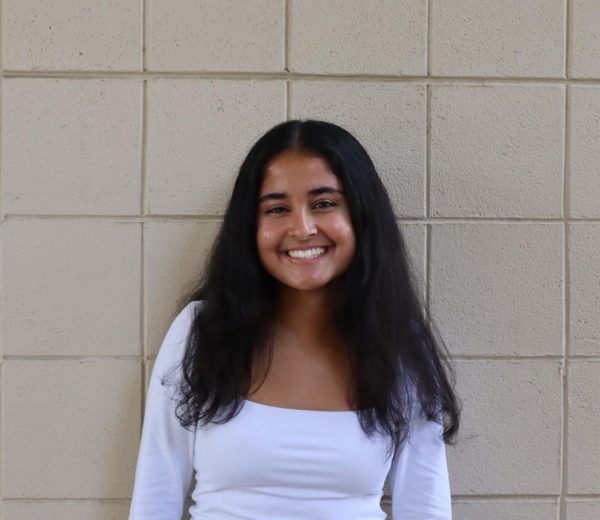As the final note of Cecil Forsyth’s “Viola Concerto in G Minor, I. Appassionato,” rang throughout the McAfee Theater, the crowd stood up to give a standing ovation for one of the 2023 concerto competition winners — junior violist David Kim.
After performing on March 7 during the Spring Orchestra Concert with the Saratoga Symphony Orchestra (SSO), Kim was flooded with gifts and flowers to congratulate and recognize his achievement: His year of lengthy rehearsals, practice and effort had finally paid off.
Among 20 applicants, Kim was one of four winners of this year’s concerto competition, which is held annually by the school’s music program to allow students 10th grade or above a chance to audition with a concerto, a solo performance accompanied by a full orchestra or band. Selected soloists are featured in the spring or year-end concerts with their respective ensembles, where they perform in front of a large audience.
Kim originally auditioned as a sophomore for the yearly concerto competition, but only won when he competed as a junior in December. He won alongside three other senior soloists — saxophone player Vidur Sanghi, violinist Chloe Lee and violist Tejas Tirthapura.
Kim was featured in the music program’s Spring Concert Series, while the three other winners will play during the end- concerts — with Sanghi playing with the Symphonic Wind Ensemble on May 21 and Lee and Tirthapura playing with SSO on May 23. Sanghi will perform “Concertino da Camera” by Jacques Ibert, Lee will play “Violin Concerto in D Minor, I. Allegro moderato” by Jean Sibelius and Tirthapura will play “Viola Concerto, I. Andante comodo” by William Walton.
Although Kim was accustomed to playing his piece solely with a piano accompanist, in the weeks leading up to his performance, he worked diligently to adjust to playing with the large ensemble. He said he aimed to bring out the artistic elements in the composition.
“I gained a sense of teamwork as I practiced this material more and especially with the rest of the people around me, because I feel like I really learned the power of how to connect with other people and work together to create the music in the process,” he said.
Preparing for the concert, however, came with several difficulties. Kim often rehearsed his concerto with Shiuan instead of orchestra director Michael Boitz — the actual conductor for the concert — whose absence for key rehearsals resulted from personal conflicts.
“When I had to miss a lot of score studies with Boitz and we had to reschedule a lot of things, it made [preparing for the performance] a lot more delayed and complicated,” Kim said.
Despite this challenge, Kim put on a strong performance, praised by Shiuan for his discipline in his musical interpretation and abilities, along with the way he presents himself to the audience.
“Every bone in his body is musical in the way he moves, the way that he phrases something, and the way that he is able to capture the audience,” Shiuan said. “I think that’s what really stood out about him when he competed was that, even when it was just him by himself on stage, you couldn’t help just get captivated by the way he played.”
According to Shiuan, competitive events like the concerto competition give exceptional musicians the chance to showcase their skill to a larger audience. For students who want to focus their musical interest on a specific goal, being a soloist in a concerto offers great training in playing with the accompaniment of a chamber group or ensemble.
“In some ways, [the competition] elevates the ensemble and the group as well because you see the excellence that is happening and it’s something for younger musicians to be striving for,” Shiuan said.
The competition started in 2012 after Boitz saw the pool of talented musicians exponentially increase over his years teaching at Saratoga High. He wanted to give students an opportunity to be recognized on a higher level past mere solos in ensembles.
When the competition was introduced, there were 12 total applicants, a number higher than Boitz expected. While similar concerto competitions take place in other Bay Area schools, the interest and number of competitors at SHS are exceptionally high. According to Shiuan, most schools have five to 10 applicants a year while SHS receives around 20.
For the competition selection process, five outside music educators are invited to adjudicate the auditions. To prevent bias in the judging process, Shiuan and Boitz only repeat judges every three years so that judges don’t encounter students they’ve already evaluated.
Judges are given a rubric to guide their decisions, but — according to Shiuan — ultimately aim to select the musicians “who they feel have the most musical conviction and who presents the composer’s intentions the best.” While Shiuan and Boitz don’t have a set number of soloists featured every year, they weigh the ensemble parts needed with each of the pieces, and often select around four winners a year.
“The number of winners really depends on how many students audition and have a really great showing,” Shiuan said. ”[Boitz and I] aim for four as it works out well for the number of our Spring concerts, but if we go beyond that, it’s usually for a special reason.”




























